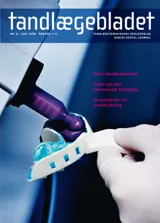Dansk tandpleje under forandring – hvad mener tandlægerne?
Dansk tandpleje præges i disse år af lovmæssige, demografiske og holdningsmæssige ændringer. Men hvordan håndteres disse ændringer af danske tandlæger, og hvor parate er tandlægerne til at varetage fremtidens krav? Dette forsøges belyst i nærværende undersøgelse. Undersøgelsen er baseret på selvrapporterede informationer indhentet ved hjælp af et postbesørget spørgeskema. I alt deltog 965 erhvervsaktive tandlæger i undersøgelsen fra både privat og offentlig tandpleje.
Klinisk relevans:
Danish oral health care in transition – what do the dentists mean? The oral health care system in Denmark is currently undergoing several changes; the national health laws have recently been changed including laws for the oral health care system, the demographic structure in Denmark is changing, and the oral health care system is in the process of promoting general health instead of focusing entirely on oral health. The purpose of the present study was to provide data to disclose the attitudes and opinions among Danish dentists in relation to the current and future oral health care system. It was the aim to identify differences that might exist between dentists working in the private dental sector and within the public dental health service in relation to future tasks in dental care of children, adolescents and adults. In total, 965 dentists participated in the study and the response rate was 76 %. The present study was carried out as a cross-sectional study and was based on self reported information. Data were collected through self administered postal questionnaires. Only dentists engaged in active employment were included in the study. The results showed that almost 60 % of the participating dentists in the present study were women. More than half of the dentists (54.5 %) worked in private dental practice and 45.5 % in the public dental service. In private dental practice more than half of the dentists had no dental hygienist while this was the case for only one quarter in the public dental service. Dentists from both sectors held the opinion that the future will show more low and high technological services but the medium technological services will remain unchanged. More than half of the dentists in private practice, as opposed to less than one quarter of the public service dentists think, that registering oral health data is time consuming. The present study shows that differences and agreements exist between the publicly and the privately engaged dentists with regards to attitudes to future oral disease trends and needs, important target groups, and the future oral health care system.


